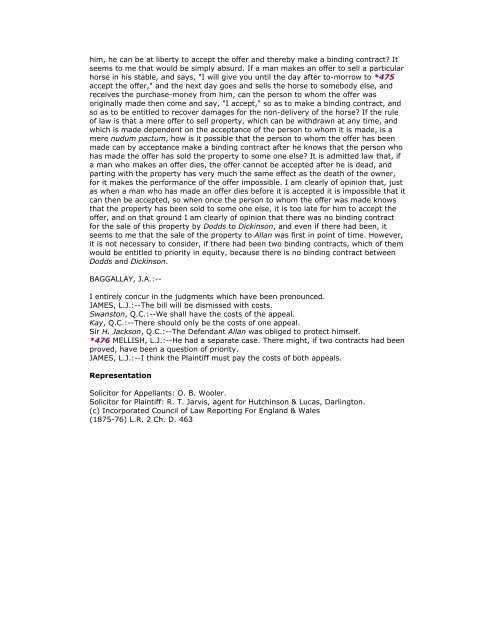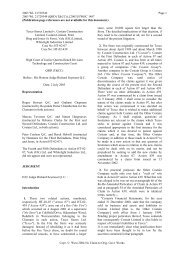Dickinson v Dodds - Thomson Reuters
Dickinson v Dodds - Thomson Reuters
Dickinson v Dodds - Thomson Reuters
You also want an ePaper? Increase the reach of your titles
YUMPU automatically turns print PDFs into web optimized ePapers that Google loves.
him, he can be at liberty to accept the offer and thereby make a binding contract? Itseems to me that would be simply absurd. If a man makes an offer to sell a particularhorse in his stable, and says, "I will give you until the day after to-morrow to *475accept the offer," and the next day goes and sells the horse to somebody else, andreceives the purchase-money from him, can the person to whom the offer wasoriginally made then come and say, "I accept," so as to make a binding contract, andso as to be entitled to recover damages for the non-delivery of the horse? If the ruleof law is that a mere offer to sell property, which can be withdrawn at any time, andwhich is made dependent on the acceptance of the person to whom it is made, is amere nudum pactum, how is it possible that the person to whom the offer has beenmade can by acceptance make a binding contract after he knows that the person whohas made the offer has sold the property to some one else? It is admitted law that, ifa man who makes an offer dies, the offer cannot be accepted after he is dead, andparting with the property has very much the same effect as the death of the owner,for it makes the performance of the offer impossible. I am clearly of opinion that, justas when a man who has made an offer dies before it is accepted it is impossible that itcan then be accepted, so when once the person to whom the offer was made knowsthat the property has been sold to some one else, it is too late for him to accept theoffer, and on that ground I am clearly of opinion that there was no binding contractfor the sale of this property by <strong>Dodds</strong> to <strong>Dickinson</strong>, and even if there had been, itseems to me that the sale of the property to Allan was first in point of time. However,it is not necessary to consider, if there had been two binding contracts, which of themwould be entitled to priority in equity, because there is no binding contract between<strong>Dodds</strong> and <strong>Dickinson</strong>.BAGGALLAY, J.A.:--I entirely concur in the judgments which have been pronounced.JAMES, L.J.:--The bill will be dismissed with costs.Swanston, Q.C.:--We shall have the costs of the appeal.Kay, Q.C.:--There should only be the costs of one appeal.Sir H. Jackson, Q.C.:--The Defendant Allan was obliged to protect himself.*476 MELLISH, L.J.:--He had a separate case. There might, if two contracts had beenproved, have been a question of priority.JAMES, L.J.:--I think the Plaintiff must pay the costs of both appeals.RepresentationSolicitor for Appellants: O. B. Wooler.Solicitor for Plaintiff: R. T. Jarvis, agent for Hutchinson & Lucas, Darlington.(c) Incorporated Council of Law Reporting For England & Wales(1875-76) L.R. 2 Ch. D. 463
















